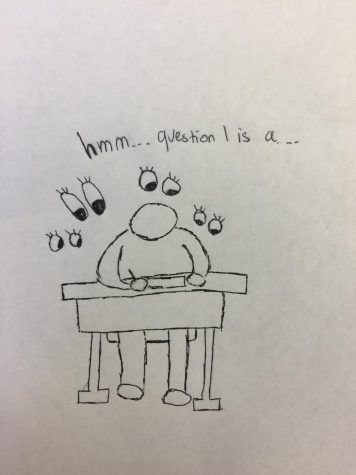College standards, high school pressure have fostered a culture of academic dishonesty
Borderline ludicrous demands from schools have made students more and more likely to cheat
59
percent of the 43,000 high school students surveyed admitted to cheating on a test in 2017, according to a poll conducted by the Josephson Institute Center for Youth Ethics. 34 percent of the same students surveyed admitted to cheating on multiple occasions.

One-third of the sample also admitted to using the Internet to plagiarize.
There is evidently an epidemic of cheating that has pervaded high school. High school students have normalized academic dishonesty. And worse yet, cheating is no longer considered heinous: in a poll cited by the Open Education Database, 60.8 percent of 30,000 students admitted to cheating, and 16.8 percent of those who did the dirty deed (approximately 18,240 cheaters) felt no remorse.
There are numerous factors, from overloading work to a biological tendency to take risks, that have fueled the culture of academic dishonesty. Perhaps, the most impactful cause is the incredibly high academic expectations that many high schools and colleges set for their students.
According to a report of the cheating culture in Stuyvesant High School in a New York Times article, a massive cheating scandal involving approximately 70 students highlights the cutthroat environment that led so many students to cheat.
“At Stuyvesant, students say the social currency is academic achievement. This competition has led students to overload themselves with work”. These high academic expectations often influence students to take classes that they cannot handle, as Stuyvesant students have. As a result, it is not uncommon for students to juggle the SAT, projects, essays, tests, AP tests, SAT subject tests, and possibly even more tasks, all in one month, all in a desperate attempt to be recognised by peers and by educational institutions as a good student. And that is when students turn to cheating to cope with their workloads.
Another major factor is the lack of respect students have for teachers. How many times have you heard a classmate say something along the lines of “my teacher didn’t teach me anything, so I have to cheat to pass this test”?
In the same New York Times article, an unnamed alumnus had little regard for French, and thus said, “When it came to French class, where the teacher had literally taught me nothing all year, and during the final the students around me were openly discussing the answers, should I not listen?” Clearly, students tend to cheat in classes they do not care about. Usually high schools will require students take certain classes (such as Homestead itself, where students are required to delve in all of the educational departments). As shown by this Stuyvesant alumnus, students often hold the belief that there is no point in learning a subject honestly if they do not care about it.
One must also consider the teenagers themselves. Biologically, they are very likely to take risks, according to Dr. David Rettinger, who said, “In high school, they’re risk takers developmentally, and can’t see the consequences of immediate actions … “Even delayed consequences are remote to them.”
Teenagers’ willingness to cheat is also compounded by their peers. Students are more likely to cheat if their classmates do so. A study conducted by University of California Davis Professor of Economics Scott E. Carell, Dr. Frederick V. Malmstrom and Baylor University Professor of Economics James E. West found that students were more likely to cheat if others did so as well. At Stuyvesant, students helped each other cheat, leading to a twisted sense of camaraderie: “Many classes have private Facebook groups that students use to exchange advice or, sometimes, to post full sets of answers for classmates to copy.”
And lastly, students cheat because they may get around with their consequence. According to the Open Education Database, a poll conducted at Fordham University “noted a significant gap between the GPAs of cheating students and their honest counterparts.” Cheaters had an average GPA of 3.41, while the honest had a 2.85.
How do these factors play out? In essence, the onslaught of academic pressure, peer pressure and lack of respect for teachers, compounded by the willingness to take risks, have resulted in the creation of a student culture wherein all morality had decayed into nothing and unethical academic achievement has become normalized, or even rewarded.
How do we fix it? Increasing punishment will not solve anything. Students will take risks despite the consequences, Rettinger explains.
Instead, schools do need a better student-teacher communication system. Students cheat often because they dislike the teacher and the coursework. By helping students understand the importance of the classes they take, teachers can create an environment where students genuinely care about what they learn. This will deter students from betraying their teachers’ trust.
Moreover, the value of students should not be based off of how rigorous their classes are. Colleges and high schools must view students as individuals who have the potential to benefit society rather than a set of grades and test scores.
Students must put less of an emphasis on how many challenging classes they take and how well they do on SATs or APs. Rather, they should learn about subjects they care about —subjects they see themselves majoring in and pursuing for the next fifty or so years. Only then can the cheating epidemic be assuaged.







